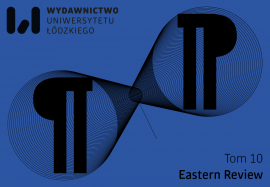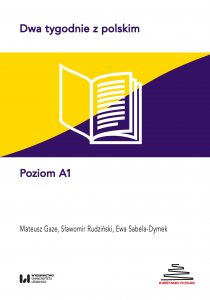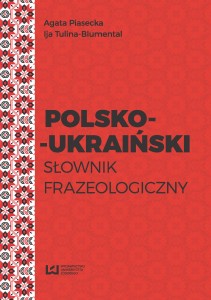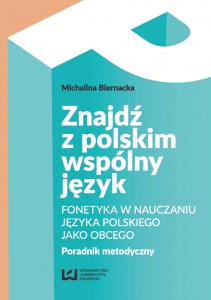EASTERN REVIEW | TOM 10
Opublikowano: 20 czerwca 2022

Eastern Review jest czasopismem naukowym redagowanym przez Międzynarodowe Centrum Badań Wschodnioeuropejskich Uniwersytetu Łódzkiego we współpracy z Komisją Badań nad Integracją Europy Polskiej Akademii Nauk Oddział w Łodzi. Zagadnienia podejmowane w czasopiśmie dotyczą problematyki polityczno-prawnej, społeczno-gospodarczej i językowo-kulturowej państw regionu Europy Wschodniej postrzeganego w kategoriach geopolitycznych i społeczno-kulturowych. W związku z tym w polu badawczym periodyku znajdują się Białoruś, Mołdawia, Rosja i Ukraina, a także inne państwa obszaru poradzieckiego. Każdy numer periodyku ma charakter tematyczny.
W numerze (PDF):
Russia in the process of constructing regional structures in Southeast Asia
Małgorzata Pietrasiak
The article aims to show the integration processes in Southeast Asia, with regard to the participation of Russia, and to determine the reason why Russia takes part in them. Based on the demonstration of the international process, two theses have been proven: (1) The project of establishing a Greater Eurasia with the participation of the Eurasian Economic Union (EAEU), the Shanghai Cooperation Organisation (SCO) and ASEAN is a grandiose and strategic goal for Russia. The project is supposed to recall the traditional policy conducted by Russia, consisting of it playing the role of a bridge between Asia and Europe drawing China’s attention to this alternative proposal to the Chinese concept of the Belt and Road Initiative. (2) Russia is a player in the geopolitical game in Southeast Asia, even though it is perceived as the closest ally of China. Under the circumstances, where the relations with the EU have been destabilised, it is in the interest of Russia to further the integration and stabilisation of the region with its more active participation. Russia’s more active participation in regional integration is hampered by its low level of economic cooperation with countries in the region and its image: the activities of Russia are still perceived through the prism of the actions and interests of China, its strategic ally both on a regional as well as global scale.
Employee’s perception of corporate social responsibility – Evidence from the Czech Republic
Simona Činčalová, Elen Jeřábková
The importance of social responsibility has an everymore prominent position. This is since the world is increasingly interconnected and globalization is constantly moving forward. The aim of the paper is to analyse the activities of social responsibility of a selected company: Bosch, and then propose specific recommendations for further development of the company. It is based on analysis of company reports, interviews with managers and a questionnaire survey. The Bosch Group is a leading global supplier of technology and services. We focused on the plant in Jihlava, in the Czech Republic. The findings show that most employees know the concept of CSR and perceive it as a positive matter and want their employer to behave according to this concept. According to them, the greatest attention should be paid to the social pillar. The survey shows that the employees know the values of the company in which they work. In terms of communication with employees with regards to the activities of CSR, it is at a high level. Finally, recommendations are proposed, including ones concerning problems with transport, eco-labels, communication and employee support.
2021 Parliamentary elections in the Republic of Moldova – An attempt at post-election analysis
Alexandr Macuhin
This article analyses the parliamentary elections held in the Republic of Moldova in 2021, as a result of which the right-wing party, formerly in opposition, won, and was able to form its own single-party government with a parliamentary majority, which has not happened in Moldova exactly 20 years – since 2001. In this article the basic positions of the “left” and “right” political camps in the Republic of Moldova before the elections are analysed; as well as the mechanics of the electoral campaign and the voting process in different socio-geographical profiles. In 2021 The Republic of Moldova, for the first time in many years, faced the phenomenon of “overturning elections”; understanding the mechanics of which contributes to the development of a much better political and electoral process in general. At the same time, despite the special nature of the 2021 elections, the electoral political process in the Republic of Moldova continues to show several fixed tendencies, such as the geographical polarization of Moldovan voters residing in the EU or Russia, and the overall objective decrease of interest in the electoral process in general, regardless of the degree of the political and social representation of the political parties represented in the elections.
Maciej Onasz, Michał Klonowski, Agata Włodarska-Frykowska
The article is an attempt to assess the effects of the 2018 reform of local electoral law on a medium scale. The main goal is to investigate the consequences of these changes for the model of political rivalry. Through the use of a selection of quantitative methods, the authors verify hypotheses regarding the proportionality of local elections and the mechanical effect of the electoral system. The overall aim is to establish to what extent the new electoral system deforms the voting results when distributing seats among the electoral committees. Apart from the hypotheses, the authors also verify whether Łódź Voivodeship is a suitable case study and representative of national trends.
Oksana Nekhaienko
The article actualizes the issue of political correctness and the need to develop tools for its further study. Political correctness is considered in the context of gender studies and power relations. The concept of attitudes towards political correctness is revealed, and an attempt is also made to reveal the mechanism of the formation of linguistic attitudes in the mass consciousness through the prism of the concepts of Stephen Lukes and Patricia Hill Collins. The historical and theoretical foundations of the formation of intersectionality are also considered. Intersectionality is focused on the study of hierarchical differences between individuals and groups, depending on the complex intersections of their position in society, determined by many parameters. Respectively, the intersectional approach to the analysis of power and language allows us to solve a number of methodological difficulties associated with the combination of macro and micro levels, which makes possible the further empirical analysis of political correctness directly as a social phenomenon, while taking it out of the linguistic sphere. Political correctness is studied as a formal embodiment of intersectionality, taking into account all the features of cross-identity in linguistic practices. The use of the intersectional method makes it possible to reveal political correctness not only as speech prescriptions, but as a multi-component phenomenon that must be considered in close connection with various kinds of discrimination. The role of power, as the main element, in the mechanisms of interiorization of attitudes towards political correctness is revealed. We highlight the role of symbolic power in ensuring voluntary consent, which is the basis for political correctness and ensures its relatively stable nature. The possibility of using discourse analysis as one of the main methods of studying political correctness is substantiated.
Krystyna Kacprowska
Family policy is a set of legal norms, actions and measures launched by the state to create appropriate living conditions for the family, its formation, proper functioning, and the fulfilment of all its important social roles. Transformation is an intentional process of changing one piece of the environment implemented over a period to create a new and primarily sustainable state of the environment. The author presents demographic data reflecting the process of the individualization of contemporary culture, which translates into changes in the contemporary family model. The main aim of the article is to present the changes taking place in the contemporary model of family policy in Poland and to analyze these phenomena.
Zapraszamy do lektury!
Komentarze
Ten post dostępny jest także w języku: angielski





